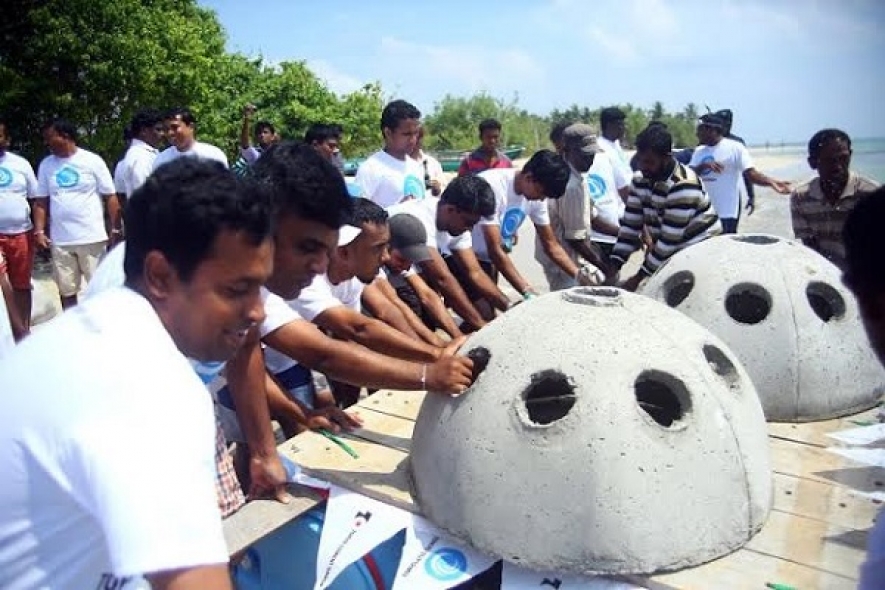TOKYO SUPERMIX teams from the Tokyo Cement Groups’ ready-mix concrete plants across the island congregated on the coast of Passikudah, to throw a lifeline for Sri Lanka’s highly threatened marine life. Out of the 203 known species of hard coral in Sri Lanka, 123 species are endemic to Passikudah. However, as much as 60% of the coral reef cover in the area has been damaged due to destructive fishing practices, coral harvesting and generations of carelessness and misinformation. In response, Tokyo Cement’s Reefballs have helped breathe new life into over 60 species of coral in Passikudah since their rehabilitation efforts were initiated towards end 2012. In an effort at island-wide collaboration, the TOKYO SUPERMIX staff, from the nation’s largest network of readymix concrete batching plants, assembled in the waters of Passikudah bay from Mahiyangana, Jaffna, Anuradhapura, Kandy, Kadawatha, Negombo, Biyagama, Trincomalee, Peliyagoda and Elpitya, to deploy 120 reefballs.
The Tokyo Cement R&D unit, in collaboration with the Wildlife Research and Conservation Trust (WRCT), has designed, built and implemented a unique reef rehabilitation technique, called Tokyo Cement Reefballs. As part of the company’s environmentally friendly manufacturing process, Tokyo Cement has developed many different ways of reusing and recycling cement waste. The reef rehabilitation project is one such initiative, where waste concrete previously discarded, is being recycled to yield multiple environmental and social benefits. Tokyo Cement has been partnering the WRCT on this one-of-a-kind marine conservation project, with support from volunteers, UNDP, the Wildlife Department, the Coast Conservation Department, marine biologists from the University of Peredinya and local fishing communities.
Tokyo Cement designs and manufactures the reefballs at their many TOKYO SUPERMIX ready-mix concrete batching plants, delivers them to the site and helps WRCT position the reefballs in the designated conservation zones in Passikudah bay, all at its own cost. The WRCT grows coral in a nursery located in shallower waters, and those live coral sprouts (or nubbins) are carefully planted on the reefballs before being transferred to deeper waters.
The corals planted on the Tokyo Cement Reefballs grow at an exceptional pace of as much as 20-22 inches every 3 months. This year Tokyo Cement plans to deploy as many as 675-1,200 reefballs along the coast of Passikudah, that will cover an area of between 756 – 1512 m2
The objective is to restore the depleted coral cover in the coast of Passikudah and thereby foster marine life. The return of the corals could also mitigate national disasters by acting as a natural shield against tides and tsunamis, as well as preventing soil erosion. Other benefits include contributing towards tourism, as flush coral reefs are a strong tourist attraction, and can potentially enhance local economies. As coral reefs allow marine ecosystems to flourish; enhancing fish population growth through protected habitats, a rehabilitated reef is expected to increase fish yields and incomes for fishing communities.
Tokyo Cement’s partners worked directly with coastal communities in implementing the reef rehabilitation programmes. As part of the project, fishing communities were given lifesaving and first aid classes by the Red Cross, and experts from the WRCT educated the communities about livelihood benefits that can be derived by preserving corals and fish habitats. The awareness programmes have helped discourage dynamite fishing, and anchoring in reefs, that were major causes of coral destruction. Today, communities in Passikudah are actually supporting coral rehabilitation by helping to plant coral and by policing the waters, preventing outsiders from conducting destructive fishing methods.
Rolling out more Tokyo Cement Reefballs
Tokyo Cement is sponsoring a 2 year study to be conducted by a Doctoral Student from the University of Peradeniya to measure and record the growth rates and species diversity of corals, whilst conducting intensive fish surveys in the rehabilitation zones. This will help develop guidelines for the evaluation and implementation of similar rehabilitation projects across the island.
The company has commissioned the WRCT to identify 2-3 new zones around the island in which the severity of coral degradation can best be turned around, through the implementation of the Tokyo Cement Reefballs, in the hopes of conducting one of the largest recorded coastal rehabilitation projects in the country. The three decade old company has incorporated the reef rehabilitation project into its business operations and hopes to build and propagate a healthy




















